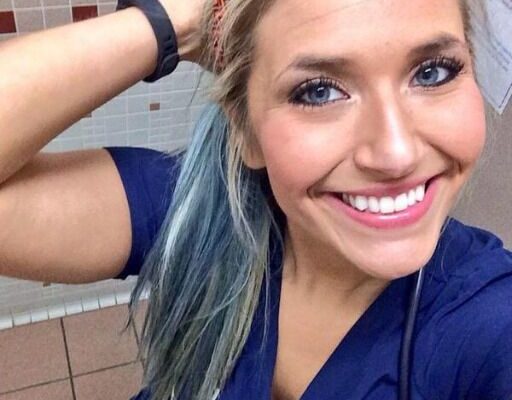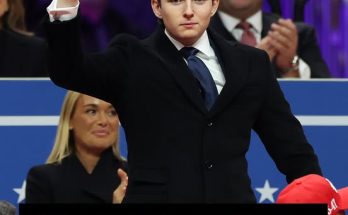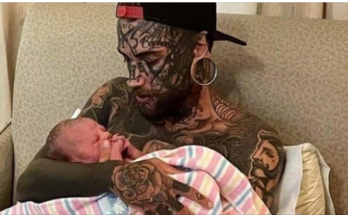I’ve been a nurse for six years now. Long shifts, aching feet, barely enough time to eat—but I love it. It’s the one place where I feel like I truly matter. Nobody cares what I look like, just that I do my job well.
But today? Today threw me back to a time I’d rather forget.
I walked into the ER room with my chart, barely glancing at the name. “Alright, let’s see what we got—” Then I looked up.
Robby Langston.
He was sitting on the bed, wincing as he held his wrist, but when he saw me, his eyes went wide. For a second, I thought maybe he didn’t recognize me. But then he did a quick, awkward glance at my face—at my nose—and I knew.
Middle school, high school… he made my life hell. “Big Becca,” “Toucan Sam,” all the creative ways to make a girl hate her own reflection. I spent years wishing I could shrink, disappear, be anyone else. But here I was, standing in scrubs, holding his chart, and he was the one needing me.
“Becca?” His voice was hesitant, almost nervous. “Wow, uh… it’s been a while.”
I kept my face neutral. “What happened to your wrist?”
“Basketball injury,” he muttered. “Just a sprain, I think.”
I nodded, checking his vitals, doing my job like I would with anyone else. But inside, I was battling old ghosts. I had imagined a moment like this before—facing my past, getting some kind of closure. Maybe even some kind of justice.
Then, as I wrapped his wrist, he let out a small, almost embarrassed laugh. “Guess karma’s funny, huh? You taking care of me after all that.”
I met his eyes. For once, he wasn’t the cocky guy from school. Just another patient, just another human.
And then he said something that made my hands pause.
“Listen…” Robby swallowed hard, shifting on the bed. “I want to say I’m sorry. For everything I did back then.”
I blinked, taken aback. An apology? From the guy who made me dread going to class, who gave me nicknames I still remember in my worst moments? I forced myself to keep my professional composure, setting aside the gauze and grabbing a wrist brace from the supply cart.
“You don’t have to say anything,” he continued, voice quieter now. “I know I was a jerk, and I can’t fix it. But I’ve thought about it a lot. Especially when I found out you became a nurse.”
He gave a weak chuckle. “I figured if anyone deserved to do something meaningful, it was you.”
I focused on Velcro straps and making sure the brace fit correctly. Part of me wanted to tell him exactly how much he hurt me—how I spent weekends hiding in my room, how I tried every ridiculous remedy to ‘shrink’ my nose, how I once begged my mom for surgery I didn’t need. But another part of me, the nurse part of me, the older, maybe wiser part of me, reminded me that I was here to help. Even if it was him.
“Well,” I said finally, testing the brace, “I appreciate that.”
There was silence for a moment, thick with everything left unsaid. I caught him watching me like he was waiting for me to unload on him. But I held my tongue. I wasn’t sure I was ready to forgive him just yet, apology or not.
Before I could say anything else, Robby winced and cradled his wrist again. “Is this supposed to hurt this much?” he asked.
I frowned. “Let me take another look.”
I checked his pulse, did a quick neurological check, then glanced at his chart. His X-rays weren’t back from Radiology yet, but something about his pale face and the way he gritted his teeth made me wonder if it was more than just a simple sprain.
“We’ll know more once the doctor reads the scans,” I said, pressing two fingers against his forearm. “Does it hurt here?”
He nodded. “Yeah, right there.”
“Okay, we’ll keep it wrapped and immobilized. Try to stay calm.”
I stepped out into the hallway, my thoughts racing. Knowing how athletic Robby was in high school—captain of the basketball team, the guy everyone cheered for—maybe he overdid it or took a bad fall. But I had a nagging feeling there was something else.
As I waited by the nurses’ station for his results, memories flashed through my mind. I remembered the day in tenth grade when Robby and his friends were mocking me in the cafeteria. I spilled my lunch all over my shirt, and they roared with laughter. I ended up in the bathroom, tears streaming down my face, wishing I could vanish.
A fellow nurse, Dina, must have seen the clouded look on my face because she nudged my arm. “Everything okay, Becca?”
I shook myself out of the memory. “Yeah, I’m alright,” I said, forcing a small smile. “Just…someone from my past showed up, that’s all.”
She gave me a sympathetic look. “Take a breather if you need it. We’re all covered for a few minutes.”
I nodded and stepped away, heading toward the staff break room. Once inside, I tried to calm my nerves with a few deep breaths. I knew I had to keep it professional, but my stomach was in knots. Robby’s presence was stirring up an old hurt I’d worked so hard to bury.
I returned to find the doctor, Dr. Yun, reading Robby’s X-rays on one of the computer screens. She frowned, tapped a few keys, then motioned me over.
“Fracture here,” she said, pointing to a tiny crack near the wrist joint. “It’s not major, but it’s definitely more than a sprain. We’ll need to put him in a cast. Could be a hairline fracture.”
I nodded, inwardly relieved to have something concrete to focus on. “Do you want me to prep the materials?”
She nodded. “Yes, and I’ll talk to him about aftercare.”
I gathered the supplies for casting—a roll of plaster, padding, some warm water—and wheeled them into Robby’s room. Dr. Yun followed.
“There’s a small fracture near your radius,” she explained to Robby. “You’ll need to be in a cast for a few weeks. We’ll do a follow-up to check on the healing.”
He slumped, looking genuinely bummed. “That means I can’t play for a while, huh?”
“Probably not,” Dr. Yun said gently. “You’ll want to rest it, keep it elevated, and do some exercises once the cast comes off.”
As she finished giving instructions, I moved in, carefully wrapping a layer of padding around his wrist and lower arm. The room was quiet—just the sound of the tape unrolling and Dr. Yun’s occasional reminders about recovery guidelines.
I tried to focus solely on the procedure, but I kept noticing Robby watching me. It was a different kind of look than the mocking stares he used to give in high school—this time, his gaze was weighted with something else. Maybe regret. Maybe curiosity.
When we were done, Dr. Yun left to see another patient, leaving me to clean up. Robby flexed his fingers carefully and sighed. “Well, guess I’m out of the next tournament.”
I shrugged, packing up the casting materials. “Better to heal properly than push yourself and make it worse.”
He nodded slowly, then looked at me with a seriousness I hadn’t seen in him before. “Hey, Becca, you got a minute?”
Part of me wanted to say no. But I also felt a strange nudge to see what he had to say. “Sure,” I murmured, setting the supply tray aside.
“I’ve been volunteering with a youth basketball league downtown,” he said, looking almost sheepish. “I was gonna help them with a fundraiser next month, but now I’m not sure how much I can do. Maybe just talk to them, help plan things…”
I stood there, arms folded, not quite sure where he was going with this.
He cleared his throat. “Look, I know I don’t have a right to ask you for anything. But I remember you used to be really good at organizing school events—you were always volunteering for the student council, setting up dances, fundraisers. I—uh, I could use some help, if you’re interested.”
He must have seen the shock on my face. I opened my mouth, then closed it, trying to form words.
“Why would I—” I began, then stopped. My first instinct was to shut him down. But the second instinct was curiosity. Could this be real? Was Robby genuinely trying to build a bridge?
He ran a hand through his hair, looking embarrassed. “You’re right. Forget I said anything. I just—I guess I wanted to show you I’m not that jerk anymore.”
I looked down at his cast. The old me would have silently rejoiced at the idea of him dealing with the inconvenience. The new me knew that wasn’t who I wanted to be. Still, I wasn’t ready to jump on board some grand basketball fundraiser project with him. “Let me think about it,” I finally said. “I appreciate the offer, but…just give me some time.”
He nodded, and I could see a flicker of relief cross his face. “Take all the time you need. I’d be grateful for any help. Here—” He scribbled a phone number on a scrap of paper. “If you decide to consider it.”
That night, I was off at seven, which was almost a miracle in the ER world. I trudged home, threw my bag down by the door, and sank onto my couch. My cat, Pinto, meowed his usual greeting, weaving around my ankles. I scooped him up, pressing my face into his soft fur, trying to clear my head.
Why on earth would I help Robby Langston of all people? The same guy who once made me trip in front of the entire cheer squad, who told me no one would ever want to date “Big Becca”?
I remembered how I used to keep a diary back then, writing long entries about how badly I wanted to be invisible. Yet here I was, a grown woman—a nurse, someone who’s helped hundreds of patients, someone who’s finally embraced the fact that my nose is just part of my face, not some giant, defining flaw. I even learned to wear bright lipstick, something I never dared to do in high school, because I was afraid it would draw attention to my face.
But that was then. This is now. Robby was different today—quieter, even remorseful. And he had apologized, which was more than I ever expected.
A week passed. During that time, I kept busy with back-to-back shifts. I tried to shove any thoughts of Robby aside. But one afternoon, as I was checking my phone during a break, I came across a flyer for the youth basketball league’s fundraiser—some of my coworkers had shared it on a local community group. Turns out they needed volunteers for everything from setting up tables to organizing raffles.
I felt a twinge of nostalgia. I used to love planning school events. There was a rush in seeing everything come together, in helping people have a good time for a good cause. And these were kids. Kids who might not have had all the advantages in life. Kids like me, who felt small or overlooked.
Without overthinking it, I typed a message to the league’s general email, offering to help. I didn’t mention Robby at all. If they needed an extra pair of hands, I was willing. That night, one of the coordinators, a woman named Ms. Calderon, wrote back, thrilled to have another volunteer.
So that’s how I found myself at the community center the next Saturday, wearing a volunteer badge, scanning the gym for Ms. Calderon. Kids were running around, bouncing basketballs, squealing with laughter. Parents chatted in the bleachers. It felt warm and welcoming.
When I spotted Ms. Calderon, I introduced myself. She gave me a quick tour, explaining how the fundraiser would help pay for new uniforms, equipment, and possibly a refurbished court. “We’re so thankful for the help, Rebecca,” she said. “We’ve got a small but dedicated group. Do you know Robby by any chance? He usually leads the practice sessions, but he’s injured right now.”
I swallowed. “Yeah, we went to high school together,” I said, keeping it vague.
She nodded with a smile. “Good guy, that one. The kids adore him. He’s always so patient with them.”
I nearly choked on my own breath. Patient? Robby? The same guy who used to make me feel like trash? I forced a polite smile and nodded.
Half an hour later, I was sorting T-shirts for the fundraiser when I felt a presence behind me. Turning around, I came face to face with Robby. He had his cast tucked against his side, and his expression hovered between apologetic and hopeful.
“Hey,” he said softly. “Didn’t expect to see you here.”
I shrugged, shifting my stack of shirts. “I saw the post about the fundraiser. Figured it was for a good cause.”
He gave a small smile. “Thanks for coming. I really appreciate it.”
We spent the next hour side by side, going over raffle donations. Despite the awkwardness, we found a sort of rhythm—filling out forms, labeling items, brainstorming ideas for silent auction baskets. I watched Robby interact with the kids—cheering them on, offering pointers on dribbling techniques. It was like seeing a whole new version of him.
At one point, a kid named Devin ran up, face shining. “Coach Robby, look! I can dribble with both hands now!”
Robby high-fived him, grin spreading wide. “Dude, that’s awesome! Keep practicing, and you’ll be unstoppable.”
Devin scampered off, and Robby turned back to me, cheeks a little red. “He calls me Coach, but I’m just a volunteer.”
I closed a file folder. “Looks like the kids look up to you.”
He hesitated, cradling his cast. “I want them to have the confidence I never really had, if that makes sense.”
I nearly laughed at the irony. “Didn’t you always seem confident in high school?”
He sighed, leaning against the table. “I pretended. My home life was—rough. My dad was strict, and I wasn’t good at meeting his expectations. I took it out on other people, and you caught the brunt of it. I know that doesn’t excuse what I did.”
I felt my throat tighten. All those years, I’d assumed he was just a golden boy with a mean streak. I never considered there might have been something else going on. It didn’t erase the pain, but it made me see him in a different light.
As the last of the kids filed out, Robby walked me to my car. The late afternoon sun cast long shadows across the parking lot. Benny, my cat at home, would be meowing for his dinner soon, but I felt something needed to be said before I left.
We stopped by my old sedan, and I turned to face him. “I’m not gonna lie, Robby—what you did to me back then hurt. A lot. I spent years feeling ugly because of those names you gave me.”
He lowered his eyes. “I know. And I’m sorry. I was too immature to realize how deep words can cut.”
I exhaled slowly, the tension in my chest easing just a bit. “I appreciate your apology. It doesn’t fix everything, but it means something.”
He gave a small nod. “I don’t expect forgiveness overnight. But I’m doing what I can to be better.”
For a moment, we just stood there, the weight of old wounds and new possibilities hanging between us. Finally, I reached into my bag and pulled out a piece of paper. “Here,” I said, handing him a short list. “It’s some ideas for the fundraiser—raffle baskets, maybe a bake sale. The community center can do the heavy lifting, but you might need volunteers for the weekend event.”
He took the paper, gratitude in his eyes. “This is great. Thank you.”
I offered a tight smile. “Just let me know if you need any help.”
A few weeks later, the big day arrived. I wasn’t scheduled at the ER, so I showed up early at the community center. Despite my lingering unease with Robby, I’d committed to helping. It felt good to invest my time in something that might actually help kids in need.
The place was buzzing with energy—bright posters, tables full of donated goods, parents dropping off baked treats for the sale. Robby, still in his cast, directed volunteers on where to set up. Ms. Calderon was everywhere at once, handling last-minute details. The air smelled like sugar, rubber basketballs, and a bit of fresh paint from the newly repaired court.
I ended up managing a booth selling raffle tickets for gift baskets. One was filled with sports gear, another with reading books, and another with local restaurant vouchers. People lined up, excited to contribute. Kids darted around, squealing with delight, clutching their own tickets.
Halfway through the day, I noticed an older man standing at the edge of the gym, watching Robby from a distance. He was tall, had a stiff posture, and an unreadable expression. Robby’s dad, maybe? It made sense. I’d never met him, but I remembered hearing rumors in high school that Mr. Langston was tough.
Sure enough, after a while, Robby walked up to the man, and they spoke quietly. I couldn’t hear them, but the tension was evident—Robby’s shoulders squared, his dad’s jaw set. Then something shifted: Mr. Langston patted Robby’s cast gently, nodded once, and quietly left. Robby stood there for a moment, almost looking stunned, then turned back to the hustle and bustle of the event.
By late afternoon, the fundraiser was winding down. People were packing up, kids and parents trickling out. We counted up ticket sales, and Ms. Calderon nearly teared up when she saw the total. “This will go a long way toward new uniforms,” she said, hugging me. “Thank you so much, Rebecca. And I have to thank Robby, too. Without his connections, we wouldn’t have had half these sponsors.”
I spotted Robby across the gym, carefully helping a volunteer stack folding chairs. Even with a cast, he was pitching in. I made my way over. “Your dad came by,” I said, handing him a stray fold-up table sign.
He glanced at me. “You saw that, huh? He just stopped by to see if I was serious about this whole community work thing. Maybe even proud, in his own way.”
I nodded, feeling a pang of empathy. “Look, I know it’s complicated. But it seems like he’s at least trying.”
Robby exhaled. “Yeah. I guess we’re both learning how to be better.”
We locked eyes, and in that moment, I felt a small fragment of the old hurt fall away. I wasn’t entirely healed, but I was moving forward, and so was he.
A week later, I found a small envelope slipped under my locker at the hospital. Inside was a handwritten note:
Becca,
Thank you for helping at the fundraiser. The kids had a blast, and we raised enough money for everything we needed. I’m grateful you gave me a chance—and I’ll keep trying to prove I’ve changed.
—Robby
Tucked behind the note was a group photo from the fundraiser: Robby, Ms. Calderon, me, and a crowd of beaming kids in mismatched uniforms. In the picture, I was smiling wide, not trying to hide any part of myself.
I stood there in the locker room, absorbing what that photo meant. It was a snapshot of two very different people, once at odds, working together for something bigger than their past. Whatever else happened, I realized I felt lighter—like I’d dropped a burden I’d been carrying for years.
We often think certain hurts can never be undone—that the things said to us when we were young will define us forever. But sometimes, life gives us a chance to see people in a new light. Healing doesn’t mean forgetting what happened; it means finding a way to keep moving forward. It means deciding that someone else’s cruelty doesn’t have the final say over who we become.
I’m not sure if Robby and I will ever be close friends. But in that ER, and later at that fundraiser, I learned that people can surprise you. We all have a story that shapes us, and sometimes the biggest step toward healing is allowing ourselves to witness someone else’s growth. You don’t have to let everyone back into your life, but you can let go of the pain. And that, in its own way, is powerful.
If this story resonated with you—if you’ve ever faced an old hurt or found hope in an unexpected apology—please share it with someone who might need encouragement. And if you believe that second chances and a bit of compassion can bring us closer together, go ahead and like this post. You never know whose heart you might touch just by sharing a reminder that it’s never too late to be better, to do better, and to let go of what’s been weighing you down.



